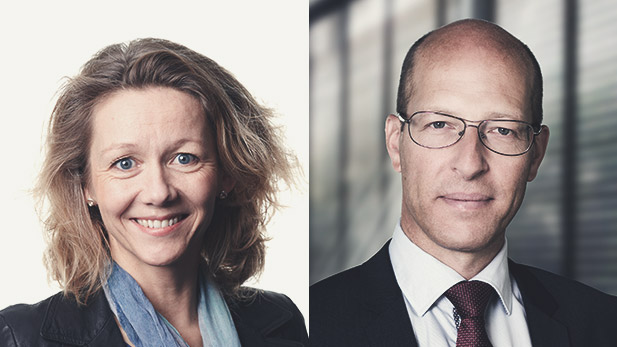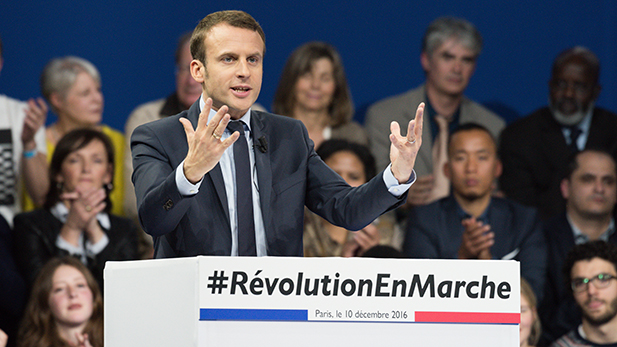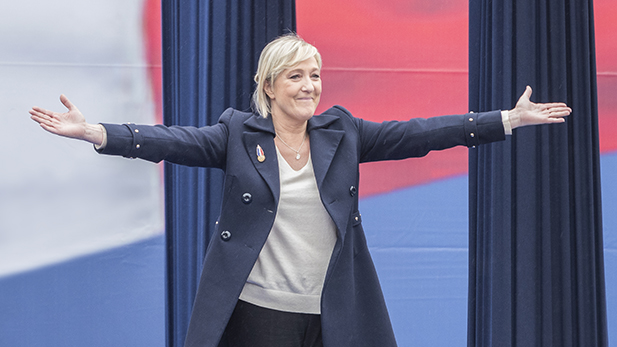A surprising French election
By Mikael Koldby, translated from Danish by Nancy Aaen, photos: Shutterstock
How would you define the 2017 election?
Mette Zølner: The thing that stands out is that nothing has progressed the way people expected it to. It’s been an election full of surprises so far. The candidates that people presumed would run, haven’t. There seems to be a mood of upheaval occurring in French politics that we haven’t yet seen the full extent of. The two candidates who stand to advance in late March belong to none of the parties that have governed French Fifth Republic (term for the French political system introduced by constitutional amendment in 1958) until now. There is Marine Le Pen of the National Front, who has never had governmental responsibility and Emmanuel Macron, with his newly founded movement "En Marche!".
Jesper Rangvid: France is a rich country but it’s fair to say that the financial markets are somewhat concerned about the lack of reforms in France, particularly regarding pensions and the labour market. Growth in France is low compared to other European countries. The left was filled with a great sense of hope when Francois Hollande of the Socialist Party was elected president, but we can see that, among the French, this has changed to a deep, deep mistrust and a feeling of discontent with Hollande. That’s why it’ll be interesting to see who is chosen next instead.
How important is the election to France?
Mette Zølner: It’s an incredibly important election for France. If the two candidates, Macron and Le Pen, continue to the next round, it’ll be a choice between a continuing French European policy as we know it today and a French Eurosceptic approach that will involve a referendum on the euro. It’s also a choice between two highly different visions for France. It will be between Le Pen’s vision of a restoration of national borders and an end to all immigration, on the one hand, and a new interpretation of republican France, on the other, based on secularism with room for all religions, in other words, a generous France that accepts refugees.
What does the election mean for the European economy?
Jesper Rangvid: There are two ways of looking at it. One involves tough financial costs and the other political costs. For the economy, if Le Pen is elected, the big question is whether she will seriously discuss the issue of France continuing with the euro. That alone would fiercely impact EU collaboration and the euro. The markets have already responded negatively to the possibility of Le Pen coming to power. Interest rates in France have already gone up quite markedly compared to interest rates in Germany, for example.
It’s important to mention that there are many what-ifs and the most likely turn of events is that Le Pen will not win, considering how the election looks right now. But there isn’t a zero percent probability, so what if? Fundamental changes will truly take place. If Le Pen wins the presidential election, if she then calls for a referendum on the euro and if France pulls out of the euro co-operation, it can potentially be as devastating as the 2008 crisis. On the political level, France and Germany have undeniably represented the core of EU co-operation, even though it’s perhaps primarily Germany that is doing the donkey work after the financial crisis. But France gives its support. That’s why the election of an anti-EU president will undoubtedly damage the EU.
Associate professor Mette Zølner and professor Jesper Rangvid from Department of Management, Society and Communication and Department of Finance (photo: Bjarke MacCarthy/CBS and Poul Christensen)
What can we expect from politics if the forecasts prove correct?
Mette Zølner: If Macron comes to power then France will have a social liberal president. He is setting the stage to implement tax and labour market reforms but plans to preserve the welfare state. In many respects, it is in fact a continuation of the economic policy under Hollande, when Macron was minister (he was Minister of Economy 2014-2016). The big change will be Le Pen. She has some campaign issues, but for the most part you can pretty much say that it‘s a populist party that has firmly established itself on one key issue, best translated as “France first”. It stands for protectionism, complete sovereignty, halting all immigration – legal and illegal – and a tough approach toward the Muslim religion and culture in French society. The two candidates are roughly neck and neck in the first round. But, in the second round, everything indicates that Macron will win over Le Pen in the same way as in 2002, when Le Pen's father met Chirac in the second round of the presidential election and lost. There is, nonetheless, a minimal risk that Le Pen will win round two so it can’t be precluded, considering how unpredictable the election campaign has been.
What impact can we expect it to have if Macron becomes president?
Jesper Rangvid: It’ll be interesting to find out what Macron wants. He is fairly left-leaning but both Fillon [of Les Républicains] and Macron’s agenda is to get the finances under control. France operates with a large government deficit of more than three percent. Both of them say that France must come below the three percent and the question is: How do you get there? Fillon, who is not up for election, has been very clear: the public sector must be subject to significant cuts. It may well be that the financial markets will be happy with a smaller government deficit, but, conversely, it’s difficult to keep cutting in the public sector, particularly in France. At this point Macron is still a bit unclear. He says of the public sector that there will be both cuts and more money spent. Le Pen and Fillon are the most outspoken. Fillon is the most conservative: down with government deficits and down with taxes; Le Pen: exit the euro cooperation. Macron is in between and there’s some uncertainty associated with him as president. Macron was responsible for the economy as a minister under Hollande and the economy didn’t do so well. From Denmark, his track record doesn’t look that great.
Macron is doing really well in the polls, but you don’t sound overly enthusiastic. Can a Macron miracle be expected?
Jesper Rangvid: The optimism concerning Macron can be justified by the fact that he can, and will, do a much better job than when he was minister. It’s possible that, as minister, he was stuck in a straightjacket because of Hollande, but he was, after all, the one sitting at the end of the Minister of Economy's table, which is why I’m a little cautious with my enthusiasm. In any case, if Marine Le Pen is not elected, then the markets will let out a sigh of relief. The big fear is Le Pen. If Macron or Fillon win, French interest rates will fall, which is good for the French economy. If Macron wins, we’ll have to wait a bit and see what he wants to do, but the markets will react calmly.
Photo: Shutterstock
What influence will the parliamentary election later this spring have if the president is not from one of the traditional parties, but Macron or Le Pen?
Mette Zølner: It’s important to have a majority in the National Assembly, because, without that, the newly elected president can’t get his policies implemented. For Macron, who founded the movement En Marche! last year, finding candidates for all constituencies is a challenge. He would be able to support the centre movement, Modem. Not only that, it’s likely that politicians from the traditional parties will be tempted to support Macron, in return for negotiating a spot in the parliamentary election. A few high-profile socialists have already declared their support, with more considering whether they should follow suit or stay in their party, which seems headed for a loss, according to the polls. The same thoughts are occurring on the right among Juppé's [former Minister for Foreign Affairs for the conservative Les Republicains] supporters. If that happens, we will see a departure from the traditional right-left divide, in favour of a new constellation around the centre. That will be new in French politics. But it’s still too early to say what will happen. The question is still being asked whether Macron can go the distance until the election.
How serious is the mood of upheaval and the risk of a landslide election?
Mette Zølner: We don’t know how extensive the need to change is. Is it a question of a need to see new faces and parties, or are there other, deeper underlying ruptures in society? The country has been through two presidential periods that have been a disappointment to many voters. The first was with Sarkozy and the second was with Hollande, and society is not quite completely out of the financial crisis yet. Unemployment continues at about ten percent. Finally, the terror attacks from last year also create uncertainty. Election analyses show that a decisive dividing line among voters appears to be for or against the EU, for or against immigration and for or against globalisation. The election campaign in France is occurring in an atmosphere of crisis. What’s more, the election campaign has been marked, until now, by accusations of corruption, creating a sense of contempt for politicians. If voter turnout is low, it may be an advantage for Marine Le Pen. Her voters are dedicated and they don’t appear to be influenced by the fact that she has also been suspected of corruption.
Photo: Shutterstock
What trends do you see in Europe in these months?
Jesper Rangvid: The Brits chose Brexit and a nationalist turn is occurring in many places. If nothing dramatic happens, such as Marine Le Pen coming to power in France, or Beppe Grillo in Italy, then the financial markets will breathe a sigh of relief. Recently, the election in the Netherlands made Geert Wilder’s party the second largest but it didn’t undergo the growth that was in the cards before the election. At this point, the French election points toward Macron. Then there’s the election in Italy. If Grillo appears to be a good choice and the markets react negatively, interest rates go up and stocks go down, then perhaps the Italians will think, “Hmm, let’s not head in that direction,” but the Italians could well think, “Let’s go down that road.”
How will French politicians handle the mood of upheaval among people after the election?
Mette Zølner: It really depends on the elections to the National Assembly and the composition of parliament. Macron is planning to conduct politics pragmatically and in a closer dialogue with the population. Getting ahold of voters, among workers and the semi-skilled, has been a challenge for the socialist party for many years. Le Pen has succeeded at this very well. What happens to their uncertainty and worries about the future if Macron comes to power? Can his policies attract them? This group has lost the most jobs to overseas. The question is, what type of majority will come to power and to what extent can Macron succeed with his pragmatic policies?
If you have any questions, please contact Mette Zølner or Jesper Rangvid.